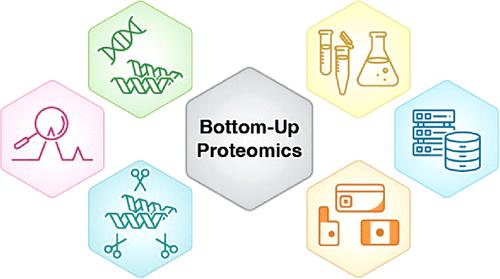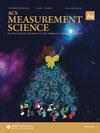Comprehensive Overview of Bottom-Up Proteomics Using Mass Spectrometry
IF 4.6
Q1 CHEMISTRY, ANALYTICAL
引用次数: 0
Abstract
Proteomics is the large scale study of protein structure and function from biological systems through protein identification and quantification. “Shotgun proteomics” or “bottom-up proteomics” is the prevailing strategy, in which proteins are hydrolyzed into peptides that are analyzed by mass spectrometry. Proteomics studies can be applied to diverse studies ranging from simple protein identification to studies of proteoforms, protein-protein interactions, protein structural alterations, absolute and relative protein quantification, post-translational modifications, and protein stability. To enable this range of different experiments, there are diverse strategies for proteome analysis. The nuances of how proteomic workflows differ may be challenging to understand for new practitioners. Here, we provide a comprehensive overview of different proteomics methods. We cover from biochemistry basics and protein extraction to biological interpretation and orthogonal validation. We expect this Review will serve as a handbook for researchers who are new to the field of bottom-up proteomics.

利用质谱技术进行自下而上蛋白质组学研究的全面概述
蛋白质组学是通过蛋白质鉴定和定量,对生物系统中的蛋白质结构和功能进行大规模研究。"散弹枪蛋白质组学 "或 "自下而上的蛋白质组学 "是目前流行的研究策略,即把蛋白质水解成肽段,然后用质谱仪进行分析。蛋白质组学研究可应用于多种研究,从简单的蛋白质鉴定到蛋白质形态、蛋白质-蛋白质相互作用、蛋白质结构改变、蛋白质绝对和相对定量、翻译后修饰和蛋白质稳定性等研究。为了开展这些不同的实验,蛋白质组分析采用了多种策略。对于新手来说,要理解蛋白质组工作流程的细微差别可能具有挑战性。在此,我们将全面介绍不同的蛋白质组学方法。我们将从生物化学基础知识、蛋白质提取、生物学解释和正交验证等方面进行阐述。我们希望这篇综述能成为自下而上蛋白质组学领域新手研究人员的手册。
本文章由计算机程序翻译,如有差异,请以英文原文为准。
求助全文
约1分钟内获得全文
求助全文
来源期刊

ACS Measurement Science Au
化学计量学-
CiteScore
5.20
自引率
0.00%
发文量
0
期刊介绍:
ACS Measurement Science Au is an open access journal that publishes experimental computational or theoretical research in all areas of chemical measurement science. Short letters comprehensive articles reviews and perspectives are welcome on topics that report on any phase of analytical operations including sampling measurement and data analysis. This includes:Chemical Reactions and SelectivityChemometrics and Data ProcessingElectrochemistryElemental and Molecular CharacterizationImagingInstrumentationMass SpectrometryMicroscale and Nanoscale systemsOmics (Genomics Proteomics Metabonomics Metabolomics and Bioinformatics)Sensors and Sensing (Biosensors Chemical Sensors Gas Sensors Intracellular Sensors Single-Molecule Sensors Cell Chips Arrays Microfluidic Devices)SeparationsSpectroscopySurface analysisPapers dealing with established methods need to offer a significantly improved original application of the method.
 求助内容:
求助内容: 应助结果提醒方式:
应助结果提醒方式:


